
Benefits Of Organic Ingredients For Healthy, Balanced Skin
Key Takeaways:
- Organic Ingredients Truly Nourish the Skin: Unlike synthetic products, organic ingredients feed the skin with real nutrients like antioxidants and fatty acids that restore balance and hydration.
- Cold-Pressed Oils Make a Difference: Processing matters — cold-pressed oils preserve vital compounds that support long-term skin health, elasticity, and natural radiance.
- Organic Skin Care Supports Sustainability: Choosing organic means fewer chemicals in ecosystems and supporting regenerative agriculture. It's better for your skin and the Earth.
Why does glowing, healthy skin often feel like a luxury rather than the norm? Between environmental stressors, synthetic chemicals, and overloaded routines, skin constantly tries to find balance, and not every product helps. The truth is, many formulas strip away the very nourishment skin needs to thrive.
At Sacred Rituel, we don’t believe in compromising. Our entire line is crafted from the most potent organic ingredients—wild-harvested, cold-pressed, and chosen for their healing, balancing, and age-defying properties. We’ve spent decades in herbal medicine formulating organic skincare that supports your skin's natural rhythms. Every drop in our bottles tells a story of purity, potency, and purpose.
In this piece, we’ll share the organic ingredients benefits that go deeper than the label — and why using an organic face moisturizer, organic face toner, or organic moisturizer can be one of the most nourishing choices you make for your skin.
Why Organic Ingredients Matter In Skincare
When caring for your skin, what you leave out can be just as important as what you put in. That’s why so many people are turning to organic skin care — not just for peace of mind, but for real, visible results.
Organic ingredients benefits go far beyond the label. These natural botanicals are grown without pesticides, synthetic fertilizers, or harsh chemicals that can irritate your skin and disrupt your body's balance. When ingredients are clean and carefully sourced, your skin receives the full nourishment of vitamins, antioxidants, and essential fatty acids — all without the baggage of toxins.
Unlike conventional products that may contain fillers, artificial fragrances, or chemical preservatives, organic skin care products focus on purity and efficacy. You’re not just avoiding the bad — you’re feeding your skin the good. That’s what makes the difference.
In a world where stress, pollution, and environmental toxins constantly bombard our skin, using organic products helps create a protective barrier while encouraging your skin to thrive naturally.

How Organic Ingredients Support Healthy, Balanced Skin
Your skin is a living, breathing organ — and just like the rest of your body, it thrives on real nourishment. Choosing products made with organic ingredients means feeding your skin with clean, unprocessed botanicals that support its natural balance. Here’s how organic skincare works with your body, not against it:
- Restores the Skin’s Moisture Barrier: Organic oils like jojoba, rosehip, and moringa mimic the natural lipids your skin already produces. These ingredients help lock in moisture, reducing dryness and preventing transepidermal water loss. When the barrier is strong, your skin stays hydrated, plump, and protected from outside irritants.
- Regulates Oil Without Stripping: Many traditional products use alcohols and harsh surfactants that remove too much oil, triggering your skin to overproduce sebum. Organic ingredients work differently — they balance oil production instead of disrupting it. This helps keep pores clear, reduces shine, and supports long-term clarity.
- Calms Inflammation and Redness: Healing botanicals like chamomile, calendula, and lavender naturally soothe irritated skin and reduce redness. These organic extracts are rich in anti-inflammatory compounds that help your skin feel more at ease. This means fewer flare-ups and a calmer complexion for sensitive or acne-prone skin.
- Protects Against Environmental Stress: Organic face care ingredients are full of antioxidants like vitamins A, C, and E that fight free radicals caused by sun, pollution, and stress. These nutrients help prevent premature aging and support the skin’s repair process. With consistent use, you’ll notice a brighter tone and more resilient skin texture.
- Supports Long-Term Balance: Organic skincare isn’t about quick fixes — it’s about long-term skin health. Consistent use of an organic face moisturizer, organic moisturizer, or organic face toner provides steady nourishment that helps your skin self-regulate over time. The result is naturally balanced skin that glows from within.
Common Organic Ingredients And Their Skin Benefits
One of the most exciting parts of switching to organic skin care is discovering just how powerful nature really is. From seed oils to flower extracts, these ingredients have been used for centuries — and now, they’re backed by science for their visible results. Below are some of the most effective and commonly used organic ingredients, and why they’re worth including in your daily ritual:
Rosehip Seed Oil – Brightening & Regenerating
Rich in natural vitamin A and essential fatty acids, rosehip oil helps reduce dark spots and smooth fine lines. It’s well-known for its ability to support skin regeneration, making it ideal for scars and uneven tone. As a staple in many organic face moisturizer formulas, it’s gentle yet powerfully restorative.
Chamomile – Calming & Anti-Inflammatory
Chamomile is rich in azulene, a compound celebrated for its powerful calming and anti-inflammatory properties. It helps soothe irritation, reduce redness, and is particularly beneficial for sensitive or reactive skin. That’s why it’s commonly found in organic facial toners designed to cool and rebalance the complexion. These benefits are also supported by research in the Therapeutic Applications of Chamomile study.
Jojoba Oil – Hydrating & Balancing
Jojoba oil closely resembles the skin’s natural sebum, allowing it to deliver deep hydration without clogging pores. It helps regulate oil production naturally, making it an ideal choice for both dry and oily skin types. As a result, it’s a staple ingredient in nearly every high-quality organic moisturizer. These qualities highlight the many Benefits of Adding Jojoba Oil to Your Skincare Routine.
Sea Buckthorn – Antioxidant-Rich & Repairing
Loaded with vitamins C and E, omega fatty acids, and carotenoids, sea buckthorn is a powerhouse for skin repair. It helps strengthen the skin barrier, supports elasticity, and gives your skin a radiant glow. This vibrant orange oil is a star in any product focused on healing and nourishment.
Green Tea (Sencha) – Protective & Detoxifying
Green tea is renowned for its high concentration of antioxidants—especially EGCG—which helps combat environmental damage. According to Evidence-Based Benefits of Green Tea, it also reduces inflammation and detoxifies the skin, making it an excellent choice for those living in urban environments or exposed to pollution. When included in an organic face toner, green tea acts as a natural defense shield, protecting and revitalizing your skin.

Organic Skincare For All Skin Types
One of the most powerful things about organic skin care is its versatility. Because organic ingredients are gentle, nutrient-dense, and free from synthetic irritants, they naturally adapt to your skin’s unique needs. Whether your skin is dry, oily, sensitive, or combination, there’s an organic moisturizer or face oil that’s made for you:
For Dry Or Dehydrated Skin
Dry skin craves deep hydration, and organic oils like baobab, moringa, and shea are rich in essential fatty acids that replenish moisture. These ingredients absorb quickly without leaving a greasy film, helping your skin feel soft, plump, and comfortable. A nourishing organic face moisturizer can lock in hydration and repair the skin barrier over time.
For Oily Or Acne-Prone Skin
It might sound counterintuitive, but oils can help balance oily skin, especially those like hemp, jojoba, and tamanu. These lightweight, non-comedogenic oils regulate sebum production and calm inflammation that often leads to breakouts. A properly formulated organic moisturizer supports clear, balanced skin without clogging pores.
For Sensitive Or Reactive Skin
Gentle botanicals like calendula, chamomile, and rose often benefit skin prone to redness, irritation, or allergic reactions. These anti-inflammatory herbs soothe and cool the skin, offering relief while supporting healing. An alcohol-free organic face toner can tone and hydrate without triggering sensitivity.
For Combination Skin
Combination skin is all about balance, and so are most organic formulations. Blends of lightweight oils and hydrating plant extracts deliver nourishment where it’s needed most, without overwhelming the skin. Ingredients like rosehip, camellia, and almond oil adapt well to areas of both dryness and excess oil.
The Environmental Impact Of Choosing Organic
Choosing organic skin care isn’t just a gift to your skin — it’s a conscious step toward a healthier planet. The way ingredients are grown, harvested, and processed plays a huge role in their environmental footprint. Here’s how opting for organic ingredients supports both your well-being and the Earth’s:
Grown Without Harmful Chemicals
Organic farming avoids synthetic pesticides, herbicides, and chemical fertilizers that harm soil, water, and wildlife. This protects farm workers and ecosystems and ensures that what you're putting on your skin is as clean as it gets. It’s skincare rooted in respect for both your health and the environment.
Supports Regenerative Agriculture
Many small farms that supply organic skin care ingredients use regenerative practices that enrich the soil and capture carbon. These methods help restore the land, rather than depleting it. By choosing products made with these ingredients, you’re investing in long-term sustainability and biodiversity.
Minimal Processing, Less Waste
Organic products, especially those made with cold-pressed oils and steam-distilled hydrosols, use low-energy methods that preserve nutrients while reducing environmental strain. They don’t rely on chemical solvents or heat-intensive processing. This results in a cleaner product with a lighter footprint.
Thoughtful Packaging Choices
Brands committed to organic values often extend their care into packaging, using recyclable, refillable, or biodegradable materials. Glass bottles, compostable mailers, and eco-conscious design help reduce waste at every step. It’s all part of a bigger picture: beauty that’s in harmony with the planet.

Final Thoughts
Choosing organic skincare is about more than just what goes on your skin — it’s a lifestyle rooted in intention, simplicity, and self-respect. It’s the recognition that true beauty doesn’t come from covering up flaws but nurturing what’s already there. Organic ingredients invite you to slow down, reconnect with nature, and let your skin thrive in its most authentic state. Every ritual becomes an act of care, not only for your appearance, but for your overall well-being.
As the skincare industry continues to evolve, the demand for transparency and integrity has never been louder. Organic formulations meet that call, not with noise, but with quiet confidence. In a world of overstimulation and artificial quick fixes, returning to organic is a return to balance. Because when your skin is supported by what’s real, it doesn’t just look healthy — it feels alive.
Read also:
- Best Vegan Skincare Brands For Conscious Consumers
- Hidden Animal Ingredients: What To Avoid In Your Skincare Products
- Top 10 Natural Ingredients For Glowing Skin
Frequently Asked Questions About Organic Ingredients Benefits
Can organic skincare be effective without synthetic preservatives?
Yes, many organic skin care products use natural preservatives like vitamin E, rosemary extract, or fermented ingredients to maintain freshness. These are gentle on the skin and support its natural microbiome. When stored properly, they’re just as stable and effective as conventional products.
Are organic ingredients better for people with allergies?
Organic ingredients tend to be gentler since they are free from artificial dyes, fragrances, and petrochemicals. However, allergies can still occur, especially with plant-based ingredients like nuts or essential oils. Always patch test new products, even if they’re organic.
Is there a difference between “natural” and “organic” in skincare?
Yes — “natural” means ingredients are derived from nature but not necessarily grown without chemicals, while “organic” refers to how they’re farmed and processed. Certified organic skin care uses ingredients that are grown without harmful pesticides or synthetic fertilizers. Organic standards are stricter and more regulated.
How do organic ingredients help skin retain moisture?
Organic ingredients like cold-pressed oils and hydrosols are rich in essential fatty acids and antioxidants. These compounds help strengthen the skin barrier and lock in hydration naturally. This is a key organic ingredients benefit for those with dry or mature skin.
Do organic moisturizers work for men’s skin, too?
Absolutely. Organic moisturizers adapt to all skin types, regardless of gender. In fact, many men find them less irritating and more effective because they avoid synthetic fillers and fragrances.
Can organic skincare help with skin conditions like eczema or rosacea?
Many people with eczema or rosacea benefit from using organic face moisturizers or toners with anti-inflammatory botanicals like calendula, comfrey, or chamomile. These ingredients soothe and calm flare-ups. While they aren’t a cure, they support barrier repair and symptom relief.
Why are cold-pressed oils used in organic face care?
Cold-pressing protects the nutrients, antioxidants, and essential fatty acids found in oils. This gentle process ensures maximum skin benefits without chemical interference. It's a cornerstone of effective organic ingredients usage in skincare.
Do organic face toners actually hydrate the skin?
Yes — especially those made from pure floral waters or hydrosols like organic rose water. These toners help prep the skin, balance pH, and deliver lightweight hydration. A good organic face toner enhances the absorption of your next skincare steps.
How long does it take to see results with organic skincare?
Results with organic ingredients tend to be gradual but long-lasting. Most users see noticeable improvements in hydration, tone, and clarity within 2 to 4 weeks. The benefits build naturally with continued use because you’re working with your skin, not against it.
Do organic skincare products have a shorter shelf life?
Organic skin care products may have a shorter shelf life because they don’t contain synthetic preservatives. However, they remain effective for months when made with natural stabilizers and stored in proper packaging, like violet glass. Always check the label for a best-by date and store in a cool, dry place.
Sources:
- Gad, H. A., Roberts, A., Hamzi, S. H., Gad, H. A., Touiss, I., Altyar, A. E., Kensara, O. A., & Ashour, M. L. (2021). Jojoba Oil: An Updated Comprehensive Review on Chemistry, Pharmaceutical Uses, and Toxicity. Polymers, 13(11), 1711. https://doi.org/10.3390/polym13111711
- Prasanth, M., Sivamaruthi, B., Chaiyasut, C., & Tencomnao, T. (2019). A Review of the Role of Green Tea (Camellia sinensis) in Antiphotoaging, Stress Resistance, Neuroprotection, and Autophagy. Nutrients, 11(2), 474. https://doi.org/10.3390/nu11020474
- Gupta, S. (2010). Chamomile: A herbal medicine of the past with a bright future. Molecular Medicine Reports, 3(6). https://doi.org/10.3892/mmr.2010.377



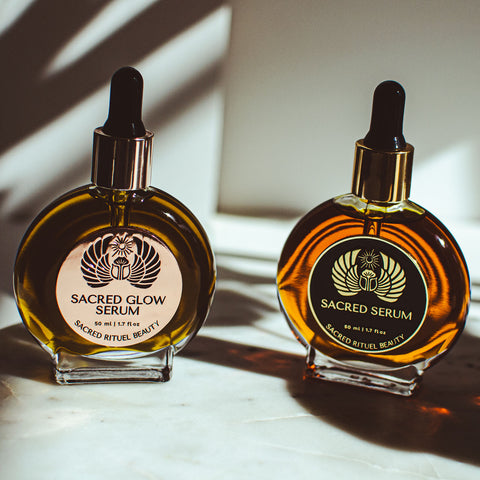
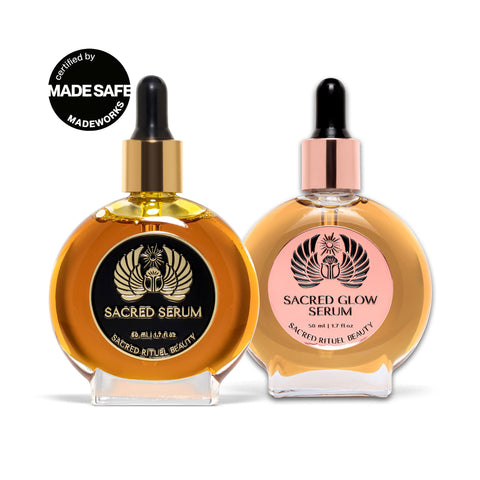
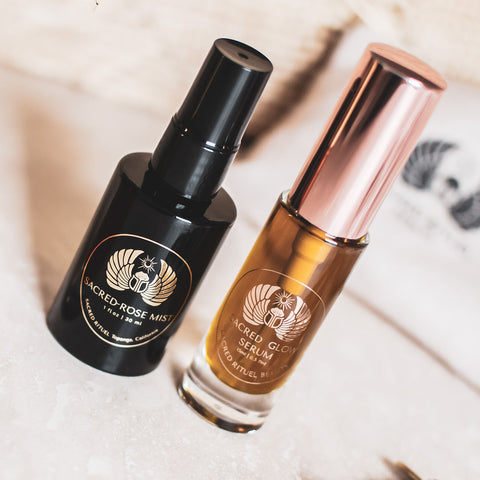
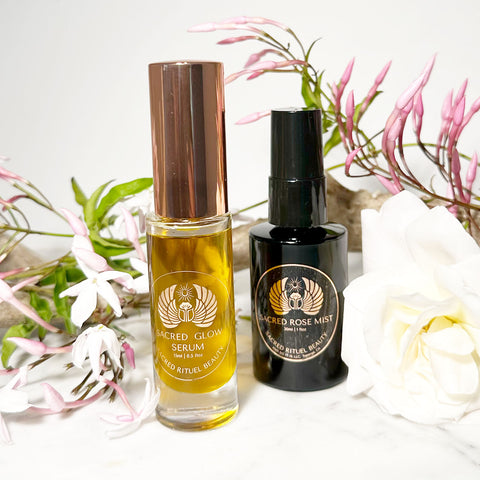

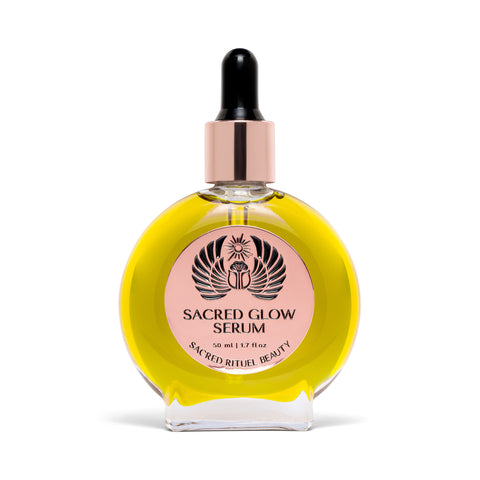
Comments (0)
There are no comments for this article. Be the first one to leave a message!